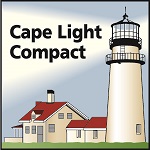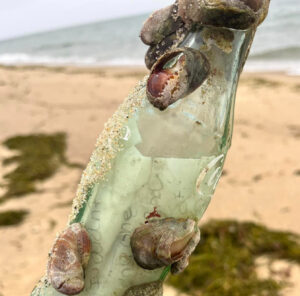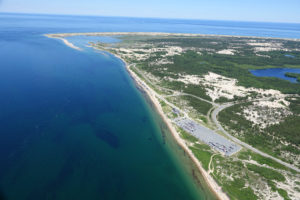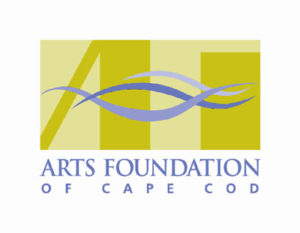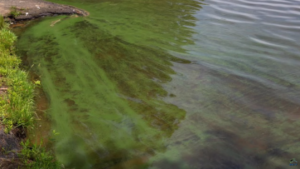
Cyanobacteria in Peters Pond, Sandwich in August of 2021.
HYANNIS – The Cape Cod region has a long way to go on water quality, according to the latest annual report from the Association to Preserve Cape Cod analyzing data collected from ponds, lakes and estuaries across the area.
Executive Director Andrew Gottlieb said that one third of the Cape’s lakes and ponds have poor water quality at any given point throughout the year.
On the estuary front, the region’s western and southern coastline—from Falmouth to Chatham—is seeing the worst of the issue, with 87% of the 47 estuaries having portions that failed to meet state water quality standards this year.
Only 6 were deemed acceptable, all on the north side of the Cape.
“Both our freshwater ponds and lakes and estuaries are impacted in somewhat different ways but by the same fundamental factor which is over-enrichment through excess nutrients entering our surface waters. Mostly through groundwater, mostly through inadequately treated human wastewater,” said Gottlieb.
He added that public drinking water supplies continue to be excellent, with towns Cape-wide having ensured water source quality over the years, save for some outlying incidents that lead to boil orders.
The analysis was pulled from a variety of publicly-accessible data reported by federal, state, towns and other public resources, including water suppliers.
Gottlieb said that some patterns can be gleaned from the data, including that all of the struggling estuaries on the western and southern coast are heavily developed and rely on septic systems for handling wastewater.
“And all of them have relatively small openings to the open ocean and very small amounts of tidal exchange. Typical tides, the difference between high and low tides on the south and west side of the Cape is three or four feet. That does not provide an opportunity for significant cleansing of the estuaries from the incoming and outgoing tide,” said Gottlieb.
“As a result, all of the nutrients that come through the groundwater accumulates in those embayments, feeds the algae, and creates the poor water quality conditions that we’re seeing.”
Gottlieb stressed the importance of reducing nutrient pollution from fertilizer, the removal of buffer vegetation, and outdated or inadequate wastewater infrastructure.
With the report, Gottlieb said that hopefully local community leaders as well as regional and state lawmakers can craft policies that will help improve the Cape’s natural resources.
He also added that future investments in wastewater infrastructure will go a long way towards recovering the water quality, especially as the year-round population on Cape Cod increases and more pressure is put on the local environment to support it.
The water quality map, as well as the results of the data collection, can be found on the APCC website here.
The full Sunday Journal podcast interview with Andrew Gottlieb can be found here.










